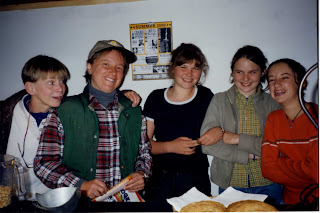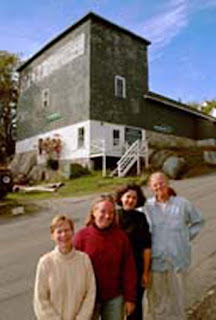 |
| Opera House Arts' first season's schedule. |
by Carol Estey, Judith Jerome, Linda Nelson and Linda Pattie
Twenty-five years ago this July -- a quarter of a century ago! -- a new island nonprofit, Opera House Arts (OHA), held its reopening gala at a restored Stonington Opera House. The nearly 100-year-old theater’s 250 seats were sold out to an audience entertained by CBS daytime soap opera star Ron Raines and Metropolitan Opera diva Lucine Amara among others, and crowned by a bright double rainbow during intermission.
As the founders of that nonprofit, now collectively departed from the organization for 10 years or more, we are awed and grateful at the whole community support that has made these 25 years possible and want to take a moment to remember and cheer on the next 25!
We and the many volunteers and talented artists from the island and around the world who have shared their gifts in community are inspired by and have sought to celebrate the uniqueness, the stories, the people, beauty and talent that characterizes this place.
 |
| Graphic designer, artist, actor and volunteer Bekka Lindstrom created the original OHA brand. |
THANK YOU for the love, passion, dedication, generosity, talent, creativity and hard work so, so many of you have shared – as artists, volunteers, board members, audiences and participants, staff, and new leadership – in support of that historic old building and of OHA’s founding mission: to use the performing arts to foster and promote excellence in ALL the ways we perform our lives: Incite Art, Create Community.
The four of us, along with our community boards and trustees, understood our nonprofit charitable purpose as to benefit, support, and add value to the year-round community.
 |
| Looking from the stage as we started to rebuild the theater. |
In 1999 when OHA purchased the Opera House, not only had Russ’s Hill slid through the back sill and wall, its mud covering half of the theater with a happy family of six raccoons claiming residence – you could also see through many of the walls and there was no heating system.
It took five years to make it possible to hold programs and generate economic impact during the 10 months of the year it is most needed. Our community board members asked for and received a predictable schedule of movies to support year-round restaurants and other businesses; as well as community and educational performance programs, from playwriting and readings to movie-making for all ages, throughout the winter.
 |
| First year's ballet classes on stage. |
Because two of our founders had a background in Performance Studies and all of us were committed to community service, OHA’s mission was based on our shared belief, then and now, that we all perform different roles as part of our daily lives: as parents, teachers, selectmen, friends, athletes, musicians, workers, etc. One way we believed OHA might make a positive difference as well as providing entertainment for the community was to integrate artists who had sought professional training into the island’s daily life, fabric, education and work.
 |
| Cue sheet from Dear Fish, an educational performance collaboration with Juneau, AK through the Kennedy Center National Partners in Education program. |
Actors study and practice how to perform their ever-changing roles with excellence. At the heart of OHA’s eight-year arts integrated learning partnership with island schools and the Kennedy Center for the Performing Arts was “The Actor’s Toolbox:” ways to become aware of and to practice how to work effectively with one’s body, voice, and imagination, as well as how to concentrate and cooperate. These are learned skills, and this “toolbox” remains a wonderful classroom and warm up practice.
We’ve found these “performance skills” to be very helpful for us all as we navigate community life, share our stories, and bring our differences together in public – sometimes in celebration, sometimes to solve the big challenges we inevitably face.
 |
| Early Wicked Good Film Series: Carol, Linda, Emmie, Galen, Ani |
Some of our fondest memories are of the programs which brought this particular community together on the stage, in the quarry, or in the streets! The very early Wicked Good Student Film Series programs, including students Walker Collin and Travis Fifield and Galen Koch, all now community leaders. The Hot 8 Brass Band and Board Chair Stan Bergen and wife Sue leading a “New Orleans meets Downeast” second-line parade down Main Street to the Fish Pier. Beloved and newly departed friend Rick Weed at “ballet practice,” swinging dancers from his excavator above the Settlement Quarry in Quarryography. School students from Brooklin, Sedgwick, and the island working with composer Maia Whitman Aprahamian to write lyrics for “Burt Dow, Deep Water Man.” Bringing Deer Isle’s last ferryman, Charlie Scott, and community leader Frank McGuire to life in “The Last Ferryman”...and now ongoing creative collaborations between OHA artists and our neighbors at Nervous Nellie’s and more! We feel very blessed to have created such a deep trove of memories and possibilities with so many of you. Thank you.
 |
| Amazing local excavator operator and dearly recently departed friend Rick Weed brings Cableman alive in Quarryography. |
 |
| As we all were then! Carol Estey, Linda Nelson, Linda Pattie, Judith Jerome |



